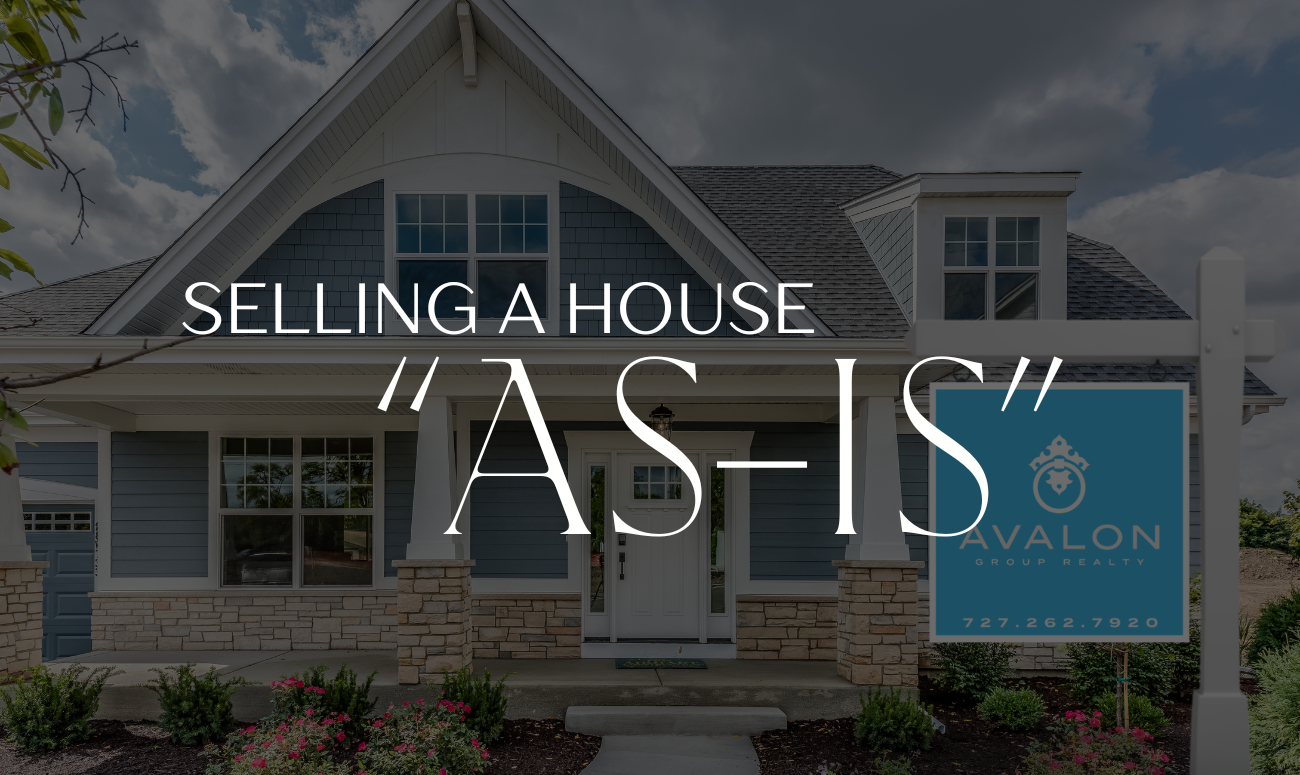Selling a House “As-Is”: What it Really Means
Selling a house “as-is” seems straightforward on the surface, but this approach often comes with misconceptions that sellers should understand before listing a home this way. Legally, selling a property “as-is” means offering the home in its current condition without any repairs or upgrades, and requiring buyers to acknowledge existing defects. However, it does not relieve sellers of all obligations – you still must answer buyers’ questions honestly about issues and avoid misrepresentation. Likewise, real estate agents have greater disclosure duties under consumer protection laws. In other words, as-is mainly dictates the lack of repairs, not a lack of transparency about problems with the home.
Selling a House “As-Is” : Problems with Selling As-Is
There are several significant downsides to listing a house as-is that sellers should contemplate. For starters, marketing a home as-is immediately gives buyers a negative perception – they will assume undisclosed major defects explain the approach and this makes it hard to overcome their skepticism about the property. Additionally, buyers will view you as desperate and make ultra-low ball offers on the home. Moreover, it becomes very challenging to demonstrate fair market value to these buyers who have preconceived notions about the property.
Likewise, very few buyers in the marketplace will even consider an as-is home unless they specifically want a fixer-upper, so you risk turning away a large portion of prospective buyers. Lastly, buyers may also struggle getting traditional mortgages if lenders require certain minimum property conditions to be met in order to qualify for financing. As-is homes often require specialized renovation loans that buyers first need to investigate and secure.
Selling a House “As-Is” : When As-Is Sales Make Sense
Occasionally, there are some legitimate reasons that may justify an as-is home sale. To illustrate, some sellers simply cannot afford to make any repairs or fixes to their property. If you genuinely have absolutely no financial means to make even minor improvements, selling the home as-is may work as a last resort. Likewise, if serious medical problems or other personal issues will prevent you from handling typical home listing tasks, an as-is sale provides a streamlined exit strategy. Moreover, companies that purchase ugly or distressed houses for cash present options for quick sales, despite their very low bids.
These investors are able to buy properties as-is due to their ability to rapidly finance and close deals. Additionally, consider making a few minor high-return fixes before listing an as-is home, such as painting rooms or removing outdated wallpaper. Small cosmetic upgrades paired with an as-is approach might yield better sale outcomes for sellers. Lastly, properly pricing an as-is home can prove extremely difficult and agents must take special care to account for needed repairs and find truly comparable sales. Without this consideration, overpricing risks occur frequently on properties being sold in their current condition.
Selling a House “As-Is” : Weighing An As-Is Sale Carefully
Having said that, most real estate professionals do not recommend preemptively marketing homes as “as-is” from the outset. Property sellers risk losing serious buyers and leaving money on the table by using an as-is approach in their listing right away. Instead, try listing the home normally first before resorting to an as-is sale if offers disappoint you. Then you can reject requests for repairs and modifications rather than advertise the property this way upfront and scare away potential buyers.
Selling a House “As-Is” : Selling to Real Estate Investors
Alternatively, selling directly to real estate investors presents advantages like speedy sales and limited hassles for overwhelmed sellers. However, you will sacrifice significant home equity in most cases for the convenience and certainty of an investor sale. Investor offers typically range from 30-50 percent below fair market property values. Ensure you fully understand total carrying costs if you cannot sell quickly on the open market before resorting to this route. Then weigh the equity losses against time factors.
Selling a House “As-Is” : The Drawbacks of Marketing As-Is
To dive deeper, let’s explore five key drawbacks that accompany marketing and selling homes in their current as-is condition:
-
Selling a House “As-Is” Decreased Sales Price
First and foremost, an as-is home will sell for significantly less than a house in good working order or updated cosmetic appearance. Buyers will incorporate assumed repair and renovation expenses into their offer prices, deducting thousands from what they bid. Savvy buyers will low-ball offers well below fair values in anticipation of negotiation room too. You stand to lose equity by pricing improvements into offers rather than completing them presale.
-
Selling a House “As-Is” Issues Securing Financing
Additionally, buyers may struggle getting mortgages secured for as-is properties. Most lenders require minimum standards and appraisals factoring in deferred maintenance. Only certain specialized loans like FHA 203k or homestyle renovation mortgages cater to fixer-uppers needing extensive repairs after purchase. This financing dilemma eliminates many potential buyers relying on standard bank loans.
-
Selling a House “As-Is” Restricted Buyer Pool
Moreover, few real estate investors aside, the vast majority of home shoppers avoid properties with undisclosed problems or required overhauls. Limiting your buyer pool to only seasoned investors slashs potential demand significantly, often translating to longer market times. Those buyers willing to take on renovations want deeply discounted pricing too.
-
Selling a House “As-Is” Lengthier Time on Market
Subsequently, the previous point feeds into extended average days on market for as-is listings waiting for the perfect buyer willing to purchase as-is and invest sweat equity into repairs. Whereas turnover stays quick for updated, move-in ready homes. And the longer a house sits, the more carrying costs accumulate for sellers.
-
Selling a House “As-Is” Negative Perceptions
Lastly, advertising as-is cement immediate suspicions about issues in buyers’ minds. They wonder what defects explain the approach and why you cannot afford repairs. It becomes an uphill battle convincing home shoppers the property merits fair pricing. Stigmas prove difficult to overcome without cosmetic improvements generating fresh appeal.
Selling a House “As-Is” : Key As-Is Sale Statistics Worth Understanding
Intriguing statistics provide further insights about trends within as-is home sales:
- Over 85% of as-is sales go to real estate investors looking for fix and flip opportunities or to build rental portfolios. This high percentage illustrates most retail buyers shy away.
- Roughly 30% of as-is listings attract multiple investor offers due to discounted pricing and renovation potential. However, bidding wars remain less common than with updated listings.
- Average sales prices on as-is homes run about 10% below market rates for comparable properties in good condition. Buyers bake discounts into deals to account for assumed upgrade expenses.
- About 75% of buyers who do purchase homes without any seller improvements plan to undertake significant renovations or remodeling projects afterwards. Few as-is buyers move in without changes.
- On average, sellers who list residences as-is save approximately 5% on repair and maintenance costs they would otherwise face selling traditionally with contingencies. However, total sale proceeds still fall short typically.
- Most (over 65%) homes sold “as is” merely need cosmetic repairs like carpet replacement or appliance upgrades rather than major structural work. This presents opportunities to maximize values with modest key fixes beforehand.
- As-is homes in urban neighborhoods tend to command higher sales prices than similarly distressed properties in rural or suburban areas due to greater demand driving housing markets in metro locations.
- Roughly 20% of buyers who opt to purchase properties as-is want to avoid entering bidding wars and prefer this route because they have limited time for house hunting. Still, these buyers present outliers from norms.
- Real estate agents report approximately 45% of their clients who sell properties consider doing so as-is at some point to simplify liabilities and reduce presale costs. However, most end up listing traditionally upon agent recommendations.
Selling a House “As-Is” : Questions Home Sellers Frequently Ask
Now, let’s explore answers to some of the most commonly asked questions about “as-is” home sales:
What factors create market conditions favoring as-is sales?
Low housing inventory coupled with high investor demand for affordable renovation projects generates ripe conditions for sellers to successfully offload homes as-is. Likewise, hyper competitive buyer markets with bidding wars and escalation clauses make as-is terms more palatable to buyers who waive contingencies just to place competitive offers. They speculate on fixing issues down the line.
Selling a House “As-Is” : What tips help market as-is homes to attract buyers?
Use professional photography and video tours to showcase a property’s potential while visually highlighting recent updates and structural integrity. Creative staging can further help buyers envision future possibilities. Emphasize desirable features over existing flaws. Target messaging at investors seeks diamonds in the rough.
Can buyers get mortgages for as-is homes needing repairs?
It depends on the extent of repairs required, the specific financing program, and whether the property meets minimum standards. Specialized renovation loans work well for some fixer upper situations, but standard conventional mortgages usually require very clean inspection reports. Most buyers still cannot finance major overhauls needed with as-is homes off the bat.
Selling a House “As-Is” : Should you sell to investors without listing open market first?
Attempting a traditional listing optimizes sale pricing and demand in most cases beforehand. If the process proves overly burdensome or offers underwhelm expectations, then proceed to contact investors for a quick, simplified sale. But sellers will leave equity on the table going straight to investors without testing retail interest upfront.
What value is lost selling to investors versus traditional open market?
Investor offers typically shake out around 30-50 percent below a home’s fair market value. Some low ball even deeper depending on needed repairs. Estimate all your carrying costs for a few extra months before accepting an ultra-low investor offer without listing first. Do this by calculating taxes, insurance, utilities, and maintenance. Then determine if those costs exceed the potential open market sale differential. Consider consulting multiple investor buyers too.
What motivates buyers to purchase as-is properties?
About 20% want to avoid competition and wish to expedite the home buying process. Another segment seeks affordable housing options and expects to slowly renovate over time. But the majority prove real estate investors themselves wanting to undertake full-scale remodels or house flipping projects. They have access to capital and view profit potential in the discounted deals.
Selling a House “As-Is” : What selling expenses do as-is home listings avoid?
Home sellers marketing properties as-is save on typical presale preparation expenses like staging, repairs, inspections, appraisals, carrying utilities, and sometimes marketing costs. However, those savings usually fail to offset the huge pricing differentials realized from inflated offers associated with turnkey, move-in ready homes. Still, each scenario differs.
Selling a House “As-Is” : Conclusion
In closing, marketing a home as-is comes with tradeoffs that property owners should understand before listing. In most cases, sellers lose considerable equity and eliminate many potential buyers by advertising properties this way upfront. Instead, start with a standard real estate listing and reject repair requests as needed. If you truly need a fast, simplified sale, selling to a real estate investor often presents advantages but also financial sacrifices that must be weighed. Discuss your specific scenario with a trusted agent to determine if pursuing an as-is approach makes the most sense for your goals. Consider all options and run calculations to make the most informed decisions.
If you are looking for a St Petersburg Realtor visit https://avalongrouptampabay.com/




